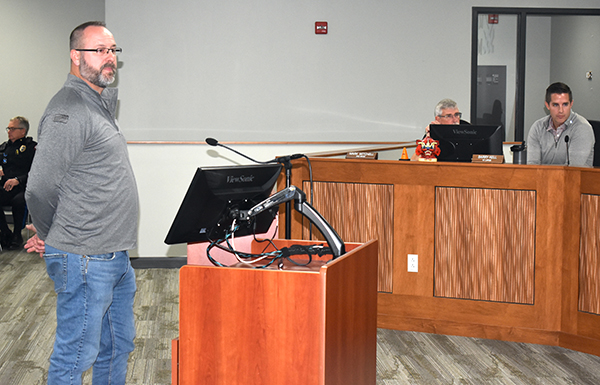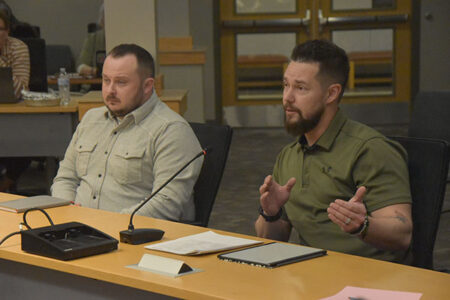Council resumes discussion on garbage study, potential changes to collection practices

T-R PHOTO BY ROBERT MAHARRY Moler Sanitation Owner Gabe Stone addresses the city council about recommendations related to the recently completed solid waste study during Monday night’s meeting.
Two weeks after Iowa State University Institute of Design Research and Outreach (IDRO) Program Coordinator Laurel Waterman presented the results of the Marshalltown solid waste study she conducted over the last several months, the city council continued to discuss its findings and potential changes to collection practices during Monday night’s meeting, with little consensus seemingly reached after over 40 minutes of consideration.
While the most noteworthy recommendation from Waterman’s study was to leave the current open market collection system in place, City Administrator Carol Webb told the council she was still seeking direction on exploring a consolidated pickup schedule, which entails haulers pick up in the same general area on the same day to encourage efficiency and minimize the impact on roads, and whether or not to require residential garbage service after the city attorney told her it would be legal but may require haulers to submit their customer lists to the city.
As the council considered the items, Councilor Jeff Schneider also reiterated his push for color coded receptacles to indicate which days they should be collected and invited the haulers in attendance to share feedback. Gabe Stone of Moler Sanitation replied that it could be explored, but Councilor Barry Kell wondered if a color coded can would solve the problem as opposed to the simple observation that only one can is out on a street.
Councilor Melisa Fonseca asked Webb about designated days in certain neighborhoods, and she noted that some haulers don’t pick up every day of the week. Fonseca expressed her support for putting out a Request for Quotes (RFQ) on an analysis to gather data on the best plan while respecting the private hauling system and improving ordinance enforcement.
Fellow Councilor Gary Thompson asked what problem the council was seeking to solve, and if it was curbside trash, he recommended repealing a previous change and requiring receptacles to be placed by houses as they were before. Kell responded that the previous ordinance update was enacted to adapt to modern collection practices after Moler instituted an automated hauler.
“Us simply going back to 1965, that’s not how garbage is collected today. That’s not how garbage trucks are probably made or manufactured anymore. It’s horse and buggy. We have to adapt to the realities of garbage collection today, whether it is a single day or a unified day,” he said. “That’s a partnership with the haulers. That’s a partnership with the consultant and the city to define, but right now our ordinance makes it absolutely impossible for us to enforce.”
Councilor and Mayor-elect Mike Ladehoff repeated his call to require garbage service to ensure that even those who can’t afford it can get their trash picked up one way or another. Councilor Greg Nichols didn’t feel that a consolidated pickup schedule would lessen the impact on streets, and Ladehoff said the study didn’t indicate that the haulers were adversely impacting the streets in the grand scheme of things.
Thompson then opined that he didn’t feel the council should be telling the private haulers how to conduct their business, comparing it to telling FedEx, Amazon, and UPS when they can deliver packages in certain neighborhoods, and he believed increased regulations would drive small haulers out of business. He also didn’t believe the council should pursue ordinances that weren’t likely to be enforced.
Schneider countered that FedEx and UPS weren’t causing complaints to the city as trash nuisances do. Before the item was opened up for public discussion, Kell took Thompson to task for his comments about wanting to make Marshalltown the cleanest city around during his mayoral campaign, but he didn’t feel that was possible with garbage cans on the curb five days a week.
“I think we all recognize (that) in the community, we want it to reflect who we aspire to be, and garbage cans are not aesthetic. But they’re utilitarian, and we need them for sanitary reasons. And I’m so appreciative of the sanitation companies and the open market system, but just because it’s gonna be hard to require a study, we just say it’s not important? I guess I reject that notion,” Kell said.
During the public comment period, Public Works Director Heather Thomas provided some history of discussions on the potential for a consolidated pickup schedule. Tim Bradbury advocated for keeping garbage by houses as opposed to curbside pickup, and Ken Lamb, the former owner of Area Sanitation, criticized the council for what he perceived as a lack of communication with the haulers as his son Wade hadn’t been to a meeting. Schneider and Kell replied that the statement was incorrect as he had been involved in a meeting 18 months ago.
Lamb took umbrage with the suggestion of color coding cans, calling out Schneider individually, and didn’t feel that the council was looking at the issue “sensibly.”
Lamb also objected to the idea of providing vouchers for “deadbeats” who fail to pay their bills and have their service discontinued.
“I think you’ve got a long ways to go. I think the system we have now just works great. The 40 some years that I was in business, I didn’t get one complaint a month about my service, and I’m sure my son and Moler and the rest of them are the same way. So I don’t know where you’re getting all the objections you’re getting to what city service we have now. I think it’s great.”
Doris Kinnick said she could not haul her garbage to the curb, especially in the winter, and Tonya Lamb of Area Sanitation clarified that the company had not been asked for input on anything other than the curbside pickup option a year and a half ago.
Webb replied that the city did reach out to the Lambs for their input when the study began, but they did not respond. The city administrator added that the council was not considering implementing a consolidated schedule but simply studying it further.
Linda Clark said Marshalltonians were largely satisfied with their garbage service the way it was and didn’t believe changes were needed, and Ray Mitchem felt that allowing residents to put their garbage out by their houses was beneficial to seniors like him. After the public comments, Schneider noted that eliminating house-side pickup has never been proposed or discussed by the council, and he wasn’t sure where that notion arose.
“It just seems like everybody’s hearing what they want to hear about this. Nobody is saying that the haulers aren’t doing a great job — they are — the problem is people not bringing in their garbage. The problem is the people making messes. That’s what we’re trying to solve here with ordinance enforcement,” Schneider said.
Tonya Lamb then returned to the podium and said they were one of the haulers who specifically asked customers not to switch to curbside pickup, and she didn’t feel Area should be punished for something they had nothing to do with. Finally, Tom Kurth, who spent decades in the garbage business himself, expressed his support for keeping the current system in place without any changes. A motion to proceed with an RFP for the study on a consolidated pickup schedule passed 5-2 with Thompson and Mark Mitchell opposed, and Webb said she knew of three companies that specialize in this specific sort of work.
The second discussion item was the proposal for mandatory garbage service, and Mayor Joel Greer asked about how difficult it would be to compile a list of customers that nuisance officers could check if issues arise. City Clerk Alicia Hunter said the haulers had agreed to release that information if a problem arises with a certain property.
Tonya Lamb stepped forward again and told the council that she didn’t feel mandating garbage service would solve the problems they were seeking to address. Fire Chief Christopher Cross also informed the council of “a significant civil problem” involving fire crews going out to monitor illegal burns within the city, mostly involving garbage.
“Whatever decision or calculus you have to come to make a good decision on this issue, which I know is touchy, I would like you to consider reducing the fire load and reducing the incidents that we’re out in the world having to inject ourselves into a civil matter,” Cross said. “Please don’t allow anybody to be left behind, however that looks.”
Schneider asked Webb if she had a chance to communicate with officials from the city of Knoxville on how their system works, and she replied that many cities in Iowa do require service.
“I don’t know, if we mandate garbage service, if people who don’t have it are gonna run out and get garbage service or if it’ll be more complaint driven, but it does give us one tool. None of this is solved by a single tool. It’s a whole toolbox of things that we can look at, some of the goals that then we have around community beautification and having a clean community,” she said.
Thompson asked if business owners who have commercial dumpsters could be exempted from the residential requirement, and Webb replied that she hadn’t seen that elsewhere. He also wondered if the haulers submitting their customer list would make them public records, to which Webb responded that she would have to look into it. Greer then joked that they could probably keep it quiet if the cooling tower that caused the Legionnaires’ disease outbreak will never be publicly revealed.
Mitchell commented that Webb should be able to check into it with all of the codes that need to be enforced and criticized an unnamed fellow councilor who said neighbors simply need to “mind their own business.” Fonseca then motioned to proceed with researching the garbage service as part of the RFQ/RFP, and it passed by a 6-1 vote with Thompson opposed.
In other business, the council:
• Approved the consent agenda as listed.
• Approved a resolution adopting amendments to the city’s purchasing policy.
• Approved agreements with the Arts + Culture Alliance for an alley creative placemaking project and a temporary art installation on city property.
• Approved the annual urban renewal report for the year ending June 30, 2025.
• Approved a series of 10 motions obligating funds for the appropriation to the payment of annual TIF obligations that will come due next fiscal year and internal debt reimbursement to the Tax Increment Revenue Fund in Urban Renewal Areas 2-7.
• Held a public hearing on the development agreement with TIG Distributing, which has not yet been finalized.
——
Contact Robert Maharry
at 641-753-6611 ext. 255 or
rmaharry@timesrepublican.com.





